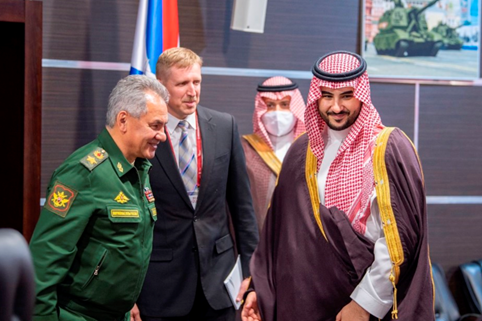Source: al-Mayadeen + Agencies 16 October 21:30
Saudi Defense Minister Hālid ibn Salmān refuses what the Western “allegations” described as Saudi Arabia’s support to Russia by the “OPEC+” decision to decrease the oil output.
Saudi Defense Minister Hālid ibn Salmān refused the Western allegations about Saudi Arabia’s support to Russia in its military operation in Ukraine.
Ibn Salmān on Sunday said: “We are astonished by the accusations that the Kingdom would stand with Russia in its war against Ukraine. These accusations are pitiful and not coming from Kiev”.
Hālid ibn Salmān: “These are lying accusations and not coming from the Ukrainian government”. He continued, “some accused the Kingdom of standing by Russia, despite the truth that the decision taken by the OPEC on 5 October to decrease the volume of production by daily two million barrels a day came by collective consent and by strictly economic reasons”.
Ibn Salmān posed the question: “Iran is also a member of the OPEC. So would that mean that we stand with Iran also?”
The Saudi Foreign Ministry had commented on the statements of American President Joe Biden and a number of American officials that considered the decision of the OPEC+ about decreasing the oil production to be a bias by the kingdom for the interest of Russia in the Ukrainian crisis.
The Saudi Foreign Ministry said that the kingdom “does not accept any form of dictations and refuses any behaviors trying to deviate the goals it tries to reach in order to protect the global economy”. Thus confirming the rejection “of the statements that the OPEC+ decision being built of political motivations against the United States”, according to the statement of the Foreign Ministry.
The Saudi Minister reiterated the post of Ukrainian President Volodimir Zelensky thanking Crown Prince Muḥammad ibn Salmān “for his support for the territorial integrity of Ukraine and announcing the help of Saudi Arabia to the country”.
On Saturday the Saudi news agency mentioned that “Crown Prince Muḥammad ibn Salmān held a telephone conversation with Ukrainian President Volodimir Zelensky in which he expressed the preparedness of the kingdom to continue its mediating efforts and to support all that is serving the de-escalation”.
OPEC+: the Decision to decrease oil production bares no political message
Secretary-General of the Oil Producing and Exporting Countries (OPEC) Haytam al-Ġayṣ said that “the decision of the OPEC+ group to decrease the production came by consent and bares no political message. It is the result of technical studies and considerations”. Thus confirming during a press conference in Algeria “that once again we reiterate that the decision to decrease production at the OPEC+ came by consent”.
Al-Ġayṣ continued: “the decision does not aim to set a certain price, yet by a price, we strive to balance between the supply and demand”. Thus pointing out that “the decision of the group bares no political message or other for anyone. Our decision strictly reflects technical principles and studies”.
The Secretary-General of the OPEC explained that “the support that the decision of the OPEC+ group enjoys about decreasing the oil production explains it being right”.
He continued: “We don’t rule over the oil prices”. Also, “we are not aiming for a certain price, but for a balance between supply and demand”, underlining that the “stability of the global oil markets is important for the future and are not just focusing on what is today”.
Blinken: The decision is not constructive to serve the market
All this comes after the statement by American State Secretary Antony Blinken on Thursday confirming in it that “the decision of Saudi Arabia to decrease the oil production will decrease the effects of the American sanctions against Russia and increase the profits of Moscow”. Thus expressing that “the time is not appropriate now to take a decision to decrease the oil production”. Also that “the Saudis have not provided principles based on serving the market for taking a decision to decrease the oil”.
Blinken added: “I talk to you now, a revision is ongoing in the relations with Saudi Arabia”.
Biden had confirmed earlier in an interview with the “CNN” network that “there will be repercussions” for Saudi Arabia for its decision within the “OPEC+” oil alliance to decrease the oil quotas.
Biden has not outlined the sphere of measures that might be taken by his administration to respond to the Saudi decision, but the spokesman of the American National Security Council John Kirby said on Tuesday that Biden wants to “revise” the relationship between Washington and Riyadh “after this Saudi diplomatic slap to the United States”.
Pic: Saudi Arabia’s Defense Minister Hālid ibn Salmān in a meeting with Russian Defense Minister Sergey Shoygu (archive)
ابن سلمان رداً على واشنطن: وقوف الرياض إلى جانب موسكو اتهامات كاذبة
المصدر: الميادين نت + وكالات 16 تشرين اول 21:30
وزير الدفاع السعودي خالد بن سلمان، يرفض ما وصفها بـ”الادعاءات” الغربية بدعم السعودية لروسيا، من خلال قرار “أوبك+” تخفيض إنتاج النفط
رفض وزير الدفاع السعودي، خالد بن سلمان، الادعاءات الغربية بدعم السعودية لروسيا في عمليتها العسكرية في أوكرانيا.
وقال ابن سلمان، اليوم الأحد: “نستغرب اتهام المملكة بالوقوف مع روسيا في حربها ضد أوكرانيا.. هذه اتهامات زائفة، لم تأتِ من كييف”.
وقال خالد بن سلمان: “هذه الاتهامات الكاذبة لم تأتِ من الحكومة الأوكرانية”، وتابع “البعض يتّهم المملكة بالوقوف إلى جانب روسيا، رغم حقيقة أنّ القرار الذي اتخذته أوبك في الخامس من تشرين الأول/أكتوبر بخفض الإنتاج بمقدار مليوني برميل يومياً كان بالإجماع، و لأسباب اقتصادية بحتة”.
وسأل بن سلمان: “إيران هي أيضاً عضو في أوبك، فهل هذا يعني أنّ المملكة تقف إلى جانب إيران أيضاً؟”.
وكانت وزارة الخارجية السعودية علّقت، في وقتٍ سابق، على تصريحات الرئيس الأميركي جو بايدن وعددٍ من المسؤولين الأميركيين، الذين اعتبروا أن قرار مجموعة “أوبك+” بخفض إنتاج النفط يعد انحيازاً من المملكة لصالح روسيا في الأزمة الأوكرانية.
وقالت الخارجية السعودية إنّ المملكة “لا تقبل أي نوع من الإملاءات وترفض أي تصرفات تهدف إلى تحوير الأهداف التي تسعى إليها، من أجل حماية الاقتصاد العالمي”، مؤكدةً رفض “التصريحات بأن قرار أوبك+ بني على دوافع سياسية ضد الولايات المتحدة” وفق بيان الخارجية.
وأعاد الوزير السعودي تغريدة في “تويتر” من قبل الرئيس الأوكراني فولوديمير زيلينسكي، شكر فيها وليّ العهد محمد بن سلمان “لدعمه وحدة أراضي أوكرانيا وإعلانه المساعدة السعودية للبلاد”.
وذكرت وكالة الأنباء السعودية السبت، أنّ “ولي العهد محمد بن سلمان أجرى اتصالاً هاتفياً بالرئيس الأوكراني فولوديمير زيلينسكي، أبدى فيه استعداد المملكة لمواصلة جهود الوساطة ودعم كل ما يسهم في خفض التصعيد”.
“أوبك“: قرار خفض الإنتاج لا يحمل أي رسائل سياسية
وقال أمين عام منظمة الدول المصدرة للنفط “أوبك”، هيثم الغيص، إن “قرار مجموعة “أوبك+” خفض الإنتاج كان بالإجماع ولا يحمل أي رسائل سياسية بل هو نتاج دراسات وأسس فنية” مؤكداً خلال ندوة صحافية في الجزائر “مرة أخرى نكرر أنّ قرار تخفيض الإنتاج في أوبك بلاس كان بالإجماع”.
وتابع الغيص: “القرار لا يستهدف تحديد سعر معيّن، ولكن نسعى من خلاله للموازنة بين العرض والطلب”، مشيراً إلى أنّ “قرار المجموعة لا يحمل رسالة سياسية أو غيرها لأحد، وقراراتنا مبنية على أسس فنية ودراسات بحتة”.
وأوضح الأمين العام لمنظمة أوبك أنّ “الدعم الذي حظي به قرار مجموعة أوبك بلاس حول خفض إنتاج النفط يوضح صحته”،
وتابع: “نحن لا نتحكم في أسعار النفط”، والمنظمة “لا تستهدف سعراً معيناً بل تستهدف التوازن بين العرض والطلب”، مشدداً على أنّ “استقرار أسواق النفط العالمية مهم للمستقبل ونحن لا ننظر إلى اليوم فقط”.
بلينكن: القرار غير مبني على أداء السوق
ويأتي ذلك، بعد تصريح لوزير الخارجية الأميركي أنتوني بلينكين، الخميس، أكّد فيه أنّ “قرار السعودية خفض إنتاج النفط سيقلّل من تأثير العقوبات الأميركية على روسيا وسيزيد من أرباح موسكو”، معتبراً أنّ “الوقت ليس مناسباً الآن لاتخاذ قرار خفض إنتاج النفط”، وأنّ “السعوديين لم يقدموا أي أساس مبني على أداء السوق لقرار خفض النفط”.
وأضاف بلينكن: “وأنا أتحدث إليكم الآن، يجري مراجعة العلاقات مع السعودية”.
وكان بايدن أكّد في حوار مع شبكة “سي إن إن”، في وقت سابق، أنّه “ستكون هناك عواقب” على السعودية بسبب قرارها في إطار تحالف “أوبك+” النفطي خفض حصص الإنتاج.
ولم يحدد بايدن ماهية الإجراءات التي يمكن أن تتخذها إدارته للرد على القرار السعودي، لكن المتحدث باسم مجلس الأمن القومي الأميركي جون كيربي قال، الثلاثاء، إنّ بايدن يريد إجراء “إعادة تقييم” للعلاقة بين واشنطن والرياض “بعد هذه الصفعة الدبلوماسية السعودية للولايات المتحدة


